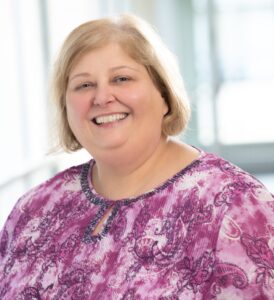 Mariah Hesse, MSN, RN, CENP
Mariah Hesse, MSN, RN, CENP Chief Nursing Officer
Sparrow Clinton Hospital
St. Johns, Michigan
Mariah Hesse, a lifelong rural resident, has not only made significant contributions to Sparrow Clinton Hospital (SCH) but has made significant contributions to Michigan’s rural health infrastructure through her role as President of the Michigan Critical Access Hospital Quality Network (MICAH QN), a position she has held since 2018. Mariah has grown the Network into a nationally recognized Quality Network, with Michigan being recognized by the Health Resources Services Administration (HRSA) as a Top 10 State for Quality Reporting and Performance since 2018.
I started 31 years ago as a Registered Nurse in Labor and Delivery at SCH, a small Critical Access Hospital (CAH) in rural Michigan. Today, my role as Chief Nursing Officer at SCH has allowed me to advocate for quality, safe patient care for CAHs across the state. During these 31 years, the community I have supported has also provided me with many growth opportunities
I have had the privilege to be part of the MiCAH QN for many years, with the last six years as the President. Being part of the network has allowed me to take part in strategic planning to continue demonstrating the value of rural hospitals and highlighting the quality of services provided in rural hospitals across the state. All 37 CAHs in Michigan voluntarily participate in quarterly meetings, share best practices and are transparent with quality outcomes to learn from each other. The outcomes and initiatives of the MiCAH QN have resulted in Michigan being recognized as a quality leader nationally. Within my own organization, we continue to build relationships and collaborate with community partners to address and impact social determinants of health.
SCH is the only CAH in Michigan to receive designation and re-designation for the ANCC (American Nurses Credentialing Center) Pathway to Excellence Program. This application and submission process took months to complete, which included collaboration with many disciplines outside of nursing, like community partners, pharmacy, and physicians, to name a few. Educating the nursing staff took innovation to promote understanding and engagement. Receiving notification that we were designated as a Pathway to Excellence Hospital by the ANCC was validation that we have built a positive working environment and have processes in place to impact outcomes in a positive way.
The “Power of Rural” means connecting people with resources to thrive in their communities. Networking and relationships are the keys to opening doors and building a solid foundation for the people and the community.
I have worked with the Michigan Center of Health (MCRH) for many years. My relationship with the MCRH is outstanding, and the support we receive is remarkable. Their support, access, and advocacy are overwhelming and difficult to put in writing.
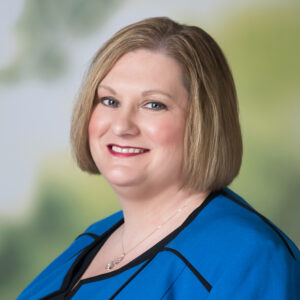
 Mercy Health-Marcum and Wallace Hospital
Mercy Health-Marcum and Wallace Hospital (Trena Stocker, Hospital President)
Irvine, Kentucky
Mercy Health Marcum & Wallace maximizes their resources to focus on contributing to their community and beyond in many ways. For example, through Project Hero, they met with groups of veterans in surrounding communities, offering resources and services often not afforded to veterans in rural areas. They also partnered with their local EMS to distribute AEDs and offer training on proper use throughout the county. This is only a small list of Mercy Health Marcum and Wallace’s many contributions towards their community; they go beyond being a health care provider/hospital and fulfill the mission of being a network of people who love and support the surrounding community.
Mercy Health- Marcum and Wallace Hospital is a 25-bed Critical Access Hospital in rural Eastern Kentucky. Our community-focused strategy expands through collaborations and educational workshops, empowering the community with knowledge and support beyond our hospital. We’re dedicated to making a true impact on our community’s health and well-being.
We continually strive to offer state-of-the-art technology to ensure patients receive top-of-the-line procedural testing. 3D Mammography was purchased through the assistance of a major fundraising campaign by the MWH Foundation and an Appalachian Regional Commission (ARC) grant. By offering 3D Mammography, we’ve identified many early-stage cancers.
The Kentucky Opioid Response Effort – Quick Response Team (QRT) comprises a collaborative, interdisciplinary partnership between local law enforcement and EMS. They conduct follow-ups after an individual overdoses and provide engagement and relationship-building to educate individuals, family members and the larger community about addiction, prevention, harm reduction, treatment and recovery, and how the QRT can assist. Thus far, in 2023, they received 82 referrals from dispatch and were able to make contact with over 40 individuals.
All CAHs and rural entities struggle with the same issues as other hospitals: rising cost of salaries, decreased reimbursement from payors, struggling economy and overall change in the healthcare landscape. Mercy Health-Marcum and Wallace has overcome these challenges in two ways: Friends and family caring for friends and family goes a long way to stem the higher turnover rates seen in an urban market and assist in higher quality of care. Additionally, truly knowing the communities we serve and understanding the healthcare needs allows the organization to offer services that will bring financial and health benefits to the community.
Rural healthcare in and of itself is Power. Taking care of someone in their community versus miles away allows that person to truly be served at their place of need. Rural healthcare is also very compassionate towards community services and needs, allowing providers and associates to work where they want to work in a positive situation.
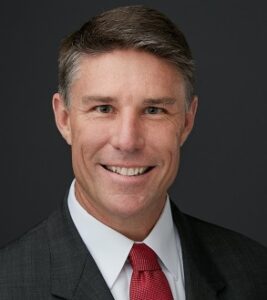 Genesis Medical Center, Aledo
Genesis Medical Center, Aledo (Ted Rogalski, Administrator)
Aledo, Illinois
This Critical Access Hospital has made the provision of mental health care in the communities it serves a top priority. They have worked closely with their community and the local health department to improve mental health and substance use treatment. Some highlights of their work include providing mental health counseling in the local schools, collaborating with the State’s Attorney’s Office to develop a drug court, and providing space for initial intake with clients at the hospital.
As the Administrator, I have had the pleasure of leading our 22-bed Critical Access Hospital and Rural Health Clinics since 2010. The hospital was a county-owned facility when I came to the organization. The first two years were focused on a financial turnaround, which was successful. We then completed an acquisition to create Genesis Medical Center, Aledo. We embarked on a $13M facility renovation and the implementation of a new EMR. The next several years focused on building the organization’s culture and improving our quality and safety performance.
As the sole healthcare provider in a very rural county (population of 16,000), providing as many local services as possible is critical, allowing easy access and eliminating the 30-mile travel to the next closest healthcare provider. We are the second largest employer in the community and have a significant economic impact, which is vital to maintaining a vibrant rural community. We have also had a lead role in creating an economic development organization that has been operating successfully over the past six years.
Mental health was the top priority in our Community Health Needs Assessment. In 2019, with the support of a HRSA Rural Outreach Grant, we partnered with the Mercer County Health Department (MCHD) to develop the Mercer County Mental Health Action Program. The goals were to improve access to mental health services and reduce barriers to care and delays in service. The hospital committed to employing a Psychiatric APRN and a behavioral health counselor, while MCHD provided a nurse navigator. Over the three-year period, 700 new, unique individuals received counseling services, 156 of whom were actively enrolled in case management. The program has been sustained post-grant and is active today. The hospital also leads a Mental Health Consortium, which brings together over a dozen community agencies to collaborate, support addressing social determinants of health and enhance our behavioral health services.
First, the “Power of Rural” is the overwhelming amount of collaboration and support that exists in our rural community. Second, our size allows us to truly know our patients and community. Not only does this provide us with a clinical benefit in delivering effective care, but it also supports our culture of friends and family caring for friends and family.
Our State Office of Rural Health has been critical in our ability to recruit and retain MDs and APPs in our Rural Health Clinic through their support of the State Loan Repayment Program. Recruiting providers to our rural community is very difficult, but this program has been instrumental in our effort to do so.
 Geer Village Senior Community
Geer Village Senior Community(Stacie Nicholas, Executive Director)
North Canaan, Connecticut
Geer’s Transportation Department provides most of the transportation to seniors and disabled individuals in the remote corner of northwest Connecticut. Transportation is provided free of charge and allows individuals to meet their healthcare and basic needs where public transportation does not exist.
Geer initiated an on-demand (Uber-style) transportation program in 2022. This program provides free transportation to anyone residing in the catchment area over the age of 60 or disabled. We collaborated heavily with other nonprofit organizations in the area to identify the need and design the program, specifically with other healthcare providers and especially with the behavioral health community. Within six months of starting the program, we served over 100 individuals, and within the first year, we provided as many rides in that program as we do in all the other transportation programs we provide. As we navigate into the second year of service, we are grateful to the private philanthropic community that has stepped up to provide a 50% match to the Department of Transportation to operate the program.
It has been challenging to meet the demand; we could increase service times and volume if funding were available. We balance the requests so that we can serve the most people in the time that we have.
It means collaborating for multiple impacts and achieving the greatest results with the resources available.
Moving to a beautiful rural area inspires me to stay and have an impact on rural health because I can be closer to nature in a smaller community and work closely with those our service directly impacts.
It was through our relationship with the Office of Rural Health that the funding to pilot this program became available. Once the pilot project proved successful, we could leverage that support to find permanent funding. Without the Office of Rural Health, this would never have happened.
 Well Fed Arkansas
Well Fed ArkansasJoshua Harris, Executive Director
Little Rock, Arkansas
Well Fed Arkansas truly embodies the essence of a Community Star through their remarkable work in transforming underserved rural areas. Their innovative model tackles food insecurity by directly reaching out to communities and providing access to healthy and nutritious food. What sets Well Fed Arkansas apart is its commitment to not just delivering food but also providing education. By creating an ecosystem where education and access to wholesome food intersect, they effectively address social determinants of health and uplift the communities they serve.
We work alongside local community partners to create long-term impact on diet-related illnesses and deficiencies. Our work in Jefferson and Phillips counties provides healthy food access to food desert areas. Participants have seen positive changes in their health and wellness because of consistent access to nutritious foods. Our programs also help build community relationships and positivity as participants learn and pick out food together at our host sites.
Together with the staff of the UAMS East clinic in Helena, we crafted and launched a Produce Prescription program for patients suffering from diet-related illnesses. While most Produce Prescription programs focus on temporary food assistance through a gift card to a retailer, we chose to innovate a market-based program whereby patients could “shop” for healthy foods onsite at their monthly wellness checkup. Well Fed oversees this novel program by focusing on the diet intervention we provide onsite at the clinic. Patients can pick out their groceries according to their dietary needs, along with our nutrition coaching. We have seen weight loss, A1C improvement, and BMI changes. Our success has been our strategic partnership and intentional approach with each patient.
We have been working towards more true diet intervention approaches to food insecurity. We see a high need for nutrition intervention beyond the need for food. Arkansas has high rates of obesity, diabetes, and cardiovascular issues among low-income communities. This health disparity has prompted us to work with healthcare professionals to develop programs strategically addressing diet intervention.
We encountered challenges in educating participants in our program as we didn’t have the expertise or the budget to provide professional nutrition coaching. We found out there are SNAP-Ed programs through the University of Arkansas Cooperative Extension and were able to form a perfect partnership.
The Power of Rural means acknowledging the potential of rural communities to make a big impact on their state. Much of rural Arkansas works hard to grow and provide industry for the rest of the state while being overlooked in public services. If we can work together to better equip our rural communities with health and opportunity, our state would be more poised to excel across the board.
 Woodlawn Health
Woodlawn Health (Paula McKinney, DNP, RN, NE-BC, Vice President of Patient Care Service & Chief Nursing Officer)
Rochester, Indiana
Because Woodlawn Health is putting patients before dollars, they have been selected as Indiana’s Community Star. Woodlawn’s “Maternity Oasis” campaign came from the desire to find a strategy to keep the Woodlawn Birthing Center from becoming another statistic…a community hospital without Obstetrical services.
It is not uncommon for Woodlawn medical providers to have the privilege of simultaneously caring for multiple generations of the same family. Depending on the provider, they may have also attended the births of multiple generations. This an example of rural care at its finest, building a trusting relationship that lasts a lifetime.
Without Woodlawn, many families would have to drive for care, and that drive would most likely deter those seeking care or not allow them to get there promptly. It is one of the many reasons Woodlawn has chosen to invest in its OB department while other rural hospitals are closing their units, giving expecting moms a place to deliver close to home!
Due to Medicaid reimbursement and the Hospital Assessment Fee (HAF) that hospitals must pay in Indiana, Woodlawn still loses two million dollars annually on its OB department. We’ve teamed up with the Indiana Hospital Association (IHA) to voice concerns about rural health care, especially OB services. Our CEO, Alan Fisher, worked with the IHA to speak with legislators and testified in Indianapolis about reducing HAF payments and increasing Medicaid. Hopefully, some reform will allow rural health systems to thrive and prevent maternity deserts in Indiana.
In 2022, Woodlawn was only delivering 12 babies a month and losing millions of dollars each year, which was not sustainable to keep our doors open. We made a commitment to our community to become a “Maternity Oasis.”
In the spring of 2023, St. Joseph in Plymouth, Indiana (25 miles to the south) stopped doing OB services and contacted Woodlawn to do emergency cases. Knowing the announcement would significantly impact many expecting moms in the adjacent county, the team sprang into action to help those affected. The marketing and OB teams collaborated to offer tours of their facility and disseminated information through social media, local newspapers, and the radio so expecting moms knew they had options. Due to the team’s efforts, we’ve seen deliveries increase to 22 in just one month, and we’ve attracted two new providers to help us care for expecting mothers. We know our emphasis on maternal care will impact families and our community for years to come by giving expecting mothers a place for care that is close to home.
There is power in caring for friends and neighbors in your community. In rural communities, many times, those relationships build over time. Our team and medical providers become trusted friends to so many. It is common for community members to remember the nurse or doctor who cared for them or their family members. They often see those caregivers at the grocery store or a school event. For many, our health system has cared for their family for generations, which is an amazing honor we do not take lightly.
 Adelaide “Addie” Eckardt, MS, PMHCNS-BC, DON
Adelaide “Addie” Eckardt, MS, PMHCNS-BC, DON Director of Nursing
Eastern Shore Hospital Center
Cambridge, Maryland
Maryland’s 2023 Community Star was selected based on her dedication and activity on behalf of rural Maryland over the past year (and decades!). She has demonstrated her support for rural health in Maryland in person and virtually at every turn. Throughout her tenure as a Maryland State Delegate and Senator, “Addie” kept a keen eye and busy legislative hands involved in rural health and nursing. Despite busy schedules and state-level contributions, she served as a long-time regional Area Health Education Board member. During the past year, she transitioned from a 28-year legislative career into public health service as a behavioral health nursing director in rural Maryland. Addie’s presence as a stalwart supporter and connector in rural Maryland is well deserving of recognition.
I am the Director of Nursing in an 82-bed State Psychiatric Forensic Inpatient Facility in Rural Maryland. I have a long-standing history of working in this facility and also serving 28 years in the Maryland General Assembly advocating for services and funding for individuals and families struggling with severe mental illness and substance use and abuse.
Through the years, I have promoted and advocated for services and funding for mental illness/brain disease. I have introduced and passed many bills to assist with the delivery system in Maryland. As a retired Senator, I now work in the hospital setting, experiencing the system changes from legislation I have worked on and passed.
Passing legislation for those incarcerated for crimes committed but need inpatient evaluation and treatment to determine competency to stand trial and get on with their lives.
Covid has severely impacted the nursing workforce. Hiring skilled licensed and unlicensed nursing staff has been challenging, and expensive travelers have been utilized to fill the void. I plan to build a workplace in which staff want to work and advance their nursing careers. We will grow our own, so to speak.
Recognizing the need for health care for everyone that is affordable, accessible, and of quality.
The Office of Rural Health has been most helpful by bringing resources to the table to facilitate the rural delivery system and building the workforce. They work through various population groups and organizations like the Area Health Education Centers and the Maryland Community Health Resources Commission. Facilitating funding for workforce needs is an example of their commitment to rural needs, and their advocacy at the Federal level is critical.
 Peggy Gautreau, RN, BSN, CNM
Peggy Gautreau, RN, BSN, CNMAdministrator
Total Family Medical
Robert, Louisiana
We opened our doors ten years ago to provide care for those with the most difficulty accessing health care. Our mission was and still is to provide full-scope health care with the goal of Dignity. Compassion. Respect. Every patient. Every time. No matter what.
Since opening Total Family Medicine, I have wanted to offer mammograms to our patients and community. I had seen a larger neighboring hospital system’s mammogram bus drive from city to city and wished we could bring that to our community. Initially, our volume was not high enough, but I would reach out to them year after year. They finally said yes as a “trial” and gave us two dates for their mammogram bus to come on-site for the year. If we could “fill up the schedule,” they would consider us. I am happy to say that we are in year three now with five yearly dates to offer mammograms!
In 2016, a horrific flood devastated our area, and we lost everything. We began seeing patients in the parking lot while figuring out our next steps. A local dentist loaned us her former dental trailer, where we saw patients while trying to rebuild a new clinic. Our State Office of Rural Health reached out to Americares, whom we had not heard of at the time. Two women from the organization flew down to help those affected by the flood. They just happened to come to my clinic (well, parking lot at the time) the day I got the call that the modular building I thought I secured wouldn’t happen unless I came up with substantially more cash to purchase the unit outright. As they toured the soaking wet clinic with watermarks 8 feet high and boxes of gloves, band-aids, etc. still floating on the floors, they overheard my frantic calls and maneuvering what we would do next. That evening, they presented me with a check from Americares for the balance on the building that I did not have. Six weeks to the day of the flood and losing everything, we were re-opened and seeing patients in our new clinic.
In one word, it means “everything” to us. Rural health care has ALWAYS been my love and passion. It helps provide care to those most in need. The “Power of Rural” makes me feel like there is a much larger force and many more people who truly share the same mission and goals. Together as one force, we are far more powerful than alone!
I always say that without our State Office of Rural Health (SORH), I would never have been able to open my doors, and I would not still be open without them! The SORH encouraged and supported me, walking me step by step through opening a Rural Health Clinic. They provide educational opportunities, networking, collaborating programs with other organizations, and so much more! Without them, we would not be where we are today and would not have been able to care for the thousands of patients over the last ten years.
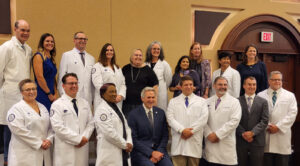 Kansas State University PA Program
Kansas State University PA Program (Gwen Ferdinand-Jacob, Physician Assistant Program Director)
Manhattan, Kansas
The Kansas State University (KSU) Physician Assistant (PA) Program was selected for its commitment to public health and the recruitment and retention of healthcare providers in rural communities.
In April of 2022, the Clinical Director of KSU’s PA program contacted the Kansas Office of Primary Care and Rural Health, housed within the Kansas Department of Health and Environment (KDHE), proposing an internship partnership between KSU and KDHE. This partnership would help new providers better understand the role of public health and bridge the learning gap in healthcare providers’ education. The student would spend time with multiple bureaus and divisions across KDHE as one of their clinical rotation electives. KDHE hosted the first PA intern in the spring of 2023. The intern spent one to three days with ten different offices within KDHE, took part in a legislative rotation to learn about the state legislative process, visited outside stakeholders, toured an FQHC, participated in site visits, and observed oral screenings performed at area elementary schools. The student later gave a presentation to his entire PA class, highlighting his experience. This one-of-a-kind collaboration would never have come to fruition without the foresight and engagement of the leadership at the KSU PA program.
The KSU PA program’s mission statement states, “…The program is dedicated to graduating physician assistants who demonstrate professionalism, are globally minded, and practice within an ethical framework to improve the quality of life of their communities and the medically underserved populations.” At least 50% of our students are residents of Kansas, most of whom are from rural areas. Students complete clinical rotations in rural Kansas. We hope this introduction to rural health will inform their final decisions regarding practice location upon program completion.
A dream and a blank piece of paper led to the development of a PA program at K-State that enrolled 35 students three and a half years later. From selecting a suitable space for the program to choosing courses that best support the PA’s future in rural health, this program would be non-existent without collaboration on multiple levels. Our search for qualified faculty resulted in 221 years of clinical practice experience. We worked with various healthcare systems, clinics, and processes to ensure our success. Our diverse student cohorts mark our success.
One of our clinical phase students recently completed the first five-week rotation with KDHE. The student benefited greatly from this experience, which helped him understand the public health role in society, preparing him for future collaboration and understanding the responsibilities of each office of KDHE. Our PA program is thankful for the opportunity to learn so much about this rotation that I am sure will become a popular elective.
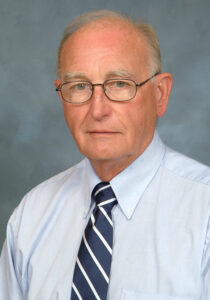 William “Bill” Coleman, MD, PhD (late)
William “Bill” Coleman, MD, PhD (late)Director, Office for Family Health Education & Research
UAB Heersink School of Medicine, Huntsville Regional Medical Campus
Huntsville, Alabama
Dr. Coleman was born and raised in a rural Alabama community (Jemison, pop. 1,000 at the time) and practiced family medicine in Scottsboro, Alabama, for 25 years (population 15,000). He lived for 83 years and never called anyplace but Alabama home. He became highly educated, with an MD and PhD; traveled the world pursuing his anatomy PhD research; became national president of the American Academy of Family Physicians; and served on advisory committees for the White House and Harvard University. But what Dr. Coleman was most personally proud of was when a medical school dean pronounced Dr. Coleman as a true “servant leader.” To Dr. Coleman, that meant his first and foremost desire as a physician was to serve his patients and his community. In a rural community, he recognized that it was the nature of his profession to support the community in any way he could, just as he relied on the community to support him as the village that helped raise his children and supported his family.
Dr. Coleman established the Office for Family Health Education & Research (OFHER) at the UAB Heersink School of Medicine. The office supports rural medicine efforts with two main projects:
A successful and collaborative project OFHER performs annually is the administration of the Alabama Rural Medical Service Award (ARMSA) in conjunction with the Alabama Department of Public Health’s Office of Primary Care and Rural Health. ARMSA exists to place primary care physicians and family medicine nurse practitioners in medically underserved areas of the state through financial incentives in the form of service loans. This project and collaboration were successful, as fourteen physicians and nurse practitioners were awarded $640,000 to practice in medically underserved areas in FY 2023.
A primary challenge in the early years was sustained funding. Dr. Coleman specifically overcame this challenge through proactive and relentless efforts to educate local and state officials across Alabama on the importance of expanded advocacy and pro-rural health policies justified through office data. Dr. Coleman did an excellent job of establishing the novel concept of capturing primary care access via the primary care service area (PCSA) model and explaining its purpose and intrinsic worth for placing physicians in rural Alabama. Due to these extensive efforts over many years, OFHER is fully funded through the Alabama Educational Trust Fund.